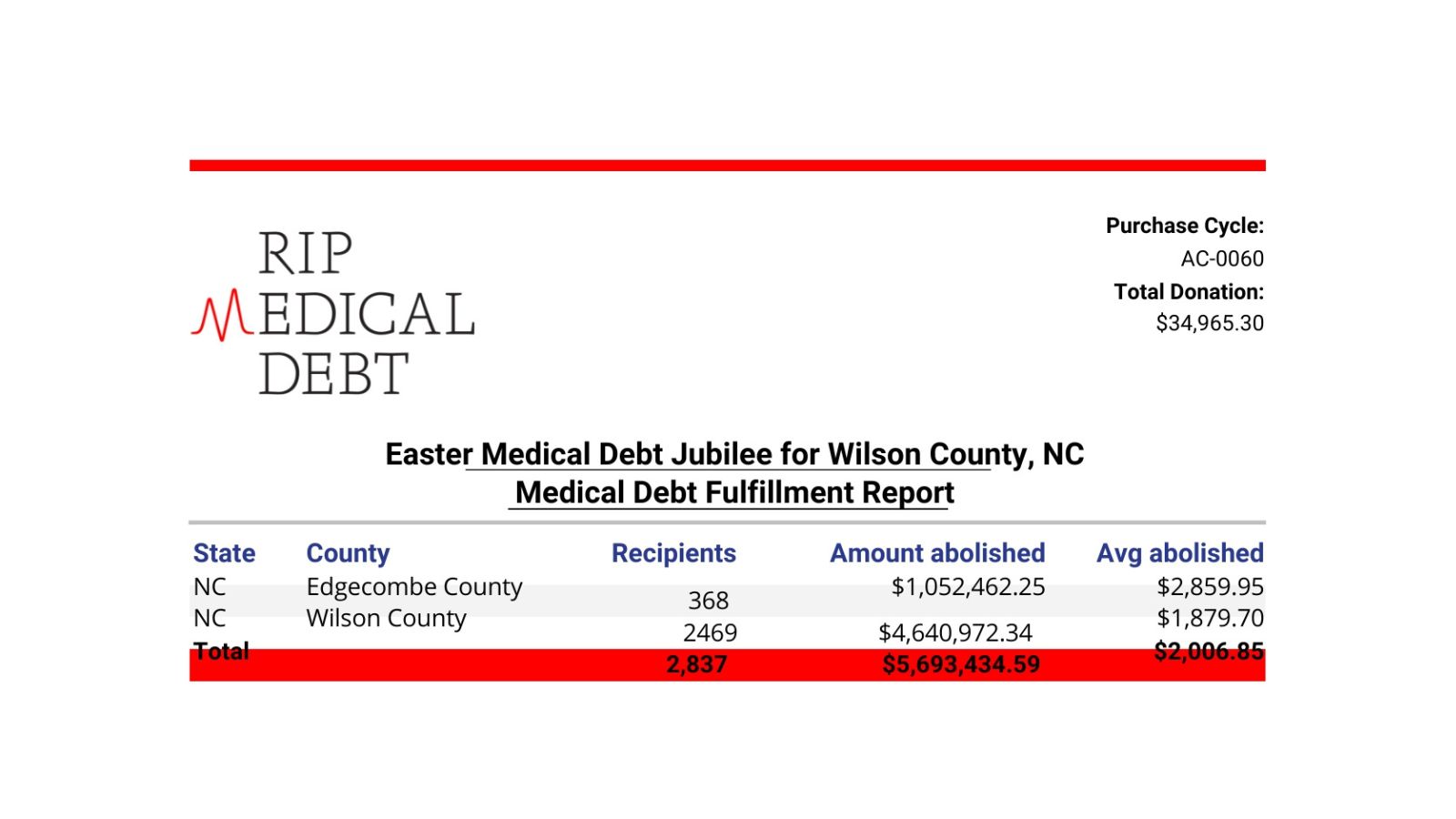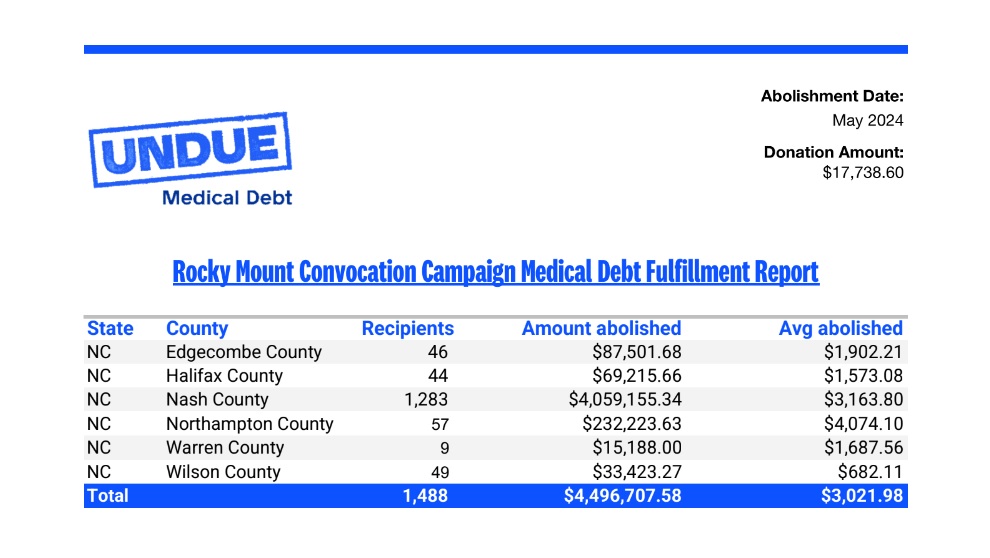“You know, Father, a lot of people in this country are only one serious medical crisis away from homelessness.”
Those words stuck with me for the rest of the day. It seemed clear that God was telling me something, but what?
Later that night, I saw a tweet by a colleague in another diocese, announcing that his congregation was doing a medical debt campaign with the organization Undue Medical Debt. That tweet helped me put the pieces together on what God was communicating to me, and I determined to start exploring this the next day.
A Lenten Fundraiser Grounded in Jubilee
Before the end of the week, I learned through Undue Medical Debt’s development office that there was enough debt in Wilson County, North Carolina to do a county-specific campaign. I determined to do this as a congregational effort to focus the traditional Lenten disciplines of prayer, fasting, and almsgiving upon this goal of eliminating the medical debt in our county. The campaign would launch with our Shrove Tuesday pancake supper, and we would endeavor to raise the funds by Easter. The copy I prepared for the campaign page was theologically grounded in jubilee, resurrection, and liberation.
With an ambitious fundraising goal of $30,000 to eliminate $4.9 million of medical debt in our county, I pitched it to my congregation that week, two Sundays before launch. I knew there were no guarantees of broad support, but I trusted that this was inspired by God. I stood in the pulpit without any written materials and did what I so often do: I just started to talk, letting the Holy Spirit give me the words.
I received a text later that night from a parishioner, relaying that she and several others thought that this was an idea worth pursuing, and that some of them were each willing to contribute $1,000. By the time we launched the campaign with our Shrove Tuesday pancake supper, we already had $14,000 committed and $8,000 of that received.
By the end of the campaign, we raised roughly $35,000—enough to eliminate $5.7 million of medical debt in our county and neighboring county. We sent the funds to Undue Medical Debt, which used the funds to purchase the debt from healthcare institutions and third party debt collectors. Then each eligible debtor was sent a letter saying that their medical debt had been canceled by our campaign.

We did another campaign the next year, eliminating all of the medical debt from six counties, totaling about $10 million of debt abolished between the two campaigns.

Why Lent as a Time for Canceling Medical Debt?
You may be wondering: Why Lent? Why make a connection with the traditional Lenten disciplines? To that end, I’ll present some of what I said to my former congregation in my sermon on that Sunday, less than two weeks before launching our first successful campaign.
1. “Doing Lent” Together as a Community of Faith
One of the things that has been lost in the western church, particularly in Protestantism but also in Roman Catholicism, is the idea that during the Lenten fast, the church fasts together. Our highly individualized world has detrimentally affected the way we live the Christian life together, and the way we “do Lent” is just one example. Our Eastern Orthodox friends in Christ never lost this. Their fasting principles may seem extreme and unattainable by our contemporary standards, but they are achievable because they participate in it communally.
What the Eastern Orthodox Church never lost sight of is that during seasons of fasting, the church fasts together, regardless of the level of each person’s participation. They are exemplars in a sort of “holy solidarity” in living out our shared Christian ascetical disciplines. This is something worthy of our attention and reclamation.
2. Reuniting Prayer, Fasting, and Almsgiving
On Ash Wednesday, when we are invited into the observance of a holy Lent, we hear the words:
“I invite you, therefore, in the name of the Church, to the observance of a holy Lent, by self-examination and repentance; by prayer, fasting, and self-denial; and by reading and meditating on God’s holy Word. And, to make a right beginning of repentance, and as a mark of our mortal nature, let us now kneel before the Lord, our maker and redeemer.” (“The Book of Common Prayer,” 265)
Participation in the traditional Lenten disciplines is no mere exercise of our personal holiness. It is a deepening of our repentance and the experience of salvation (Philippians 2:12). That it is to say, we are deepening our participation in the work that God began at baptism, transforming us ever more into the likeness of Christ through sanctifying grace. Through fasting, we subdue our passions by disciplining our appetite with the reduction and limitation of the foods we consume. Through almsgiving, we obey Christ and participate in his merciful works in the lives of poor people and thereby diminish the hold that money and possessions have over us. Through prayer, we draw closer to God and rely upon the Holy Spirit for strength in our Lenten sacrifices.
It’s easy to compartmentalize these disciplines, but they are a unity. One of the many reasons we fast is to bring us into solidarity with those who experience daily hunger with the rumbling of our bellies ringing as a chapel bell calls us to pray for those who are poor. Prayer is not a magical formula by which we convince God to do what we want but a dynamic relationship with God that changes us as we draw closer to the Father, through Christ, by the Holy Spirit. Our prayers for relief of poor people, inspired by the rumbling of our deprived bellies, ought to call us to action through almsgiving and other corporeal acts of mercy. Recalling the words attributed to St. Augustine: “Pray like everything depends on God, work like everything depends on you.” When we fast, we remember those who are poor and, calling them to mind, we pray for them; when we pray for poor people, we act toward their good fortune.
Tying It All Together
We made a commitment as a parish to “do Lent” more communally to free our neighbors from medical debt. The connection between the Lenten practices finally clicked with many people for the first time because they were able to directly experience sacrifice and generosity. By eating fewer and simpler meals and abstaining from certain luxuries, we were able to utilize the unspent funds outward rather than inward, to relieve people who are poor and ill by abolishing their medical debt. By the end of each campaign, thousands of unknown neighbors were set free from a tremendous financial burden that hung over them like the Sword of Damocles. It was an incarnational experience of the gospel, as they were freed from debt in an act of pure grace committed by the body of Christ in their community.
Featured image is by Alexander Grey on Unsplash; images of reports are provided by article author, Paul Castelli

